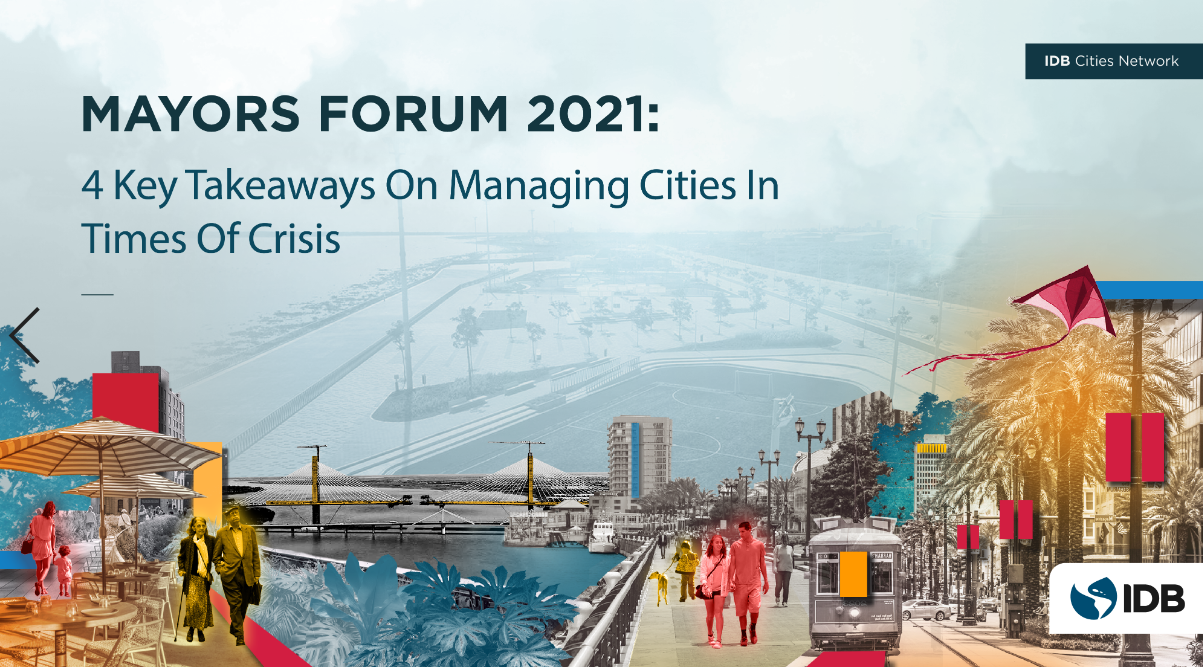The COVID-19 crisis has had an unprecedented impact on socialization dynamics and quality of life in cities all around the world. In Latin America and the Caribbean (LAC), weak social protection structures, fragmented health systems, and deep inequalities have exacerbated the crisis, leading to the worst recession the region has experienced in the last hundred years. The pandemic, in addition to inviting us to reflect on the way we live together in urban areas, has highlighted the importance of collaboration amongst leaders in order to attain the resources needed for an inclusive and sustainable recovery.
Towards and Inclusive and Resilient Recovery:
In this context, the IDB organized the Mayors Forum in March 2021. This annual event, convened by the Cities Network, brings together leaders and public officials from across the region to share best practices and exchange views on how to improve life in our cities. This year’s event, Towards an Inclusive and Resilient Recovery, emphasized the importance of boosting cities’ growth and productivity and was the first Mayors Forum to be held entirely virtually. Despite the challenges of a virtual event, we were pleased to have an audience of more than 4,700 people from over 500 cities and 40 countries.
The Forum’s regional focus and multi-sectoral nature created a unique space in which leaders were able to share, learn, and catch up on what cities in our region are doing. This blog marks the start of a series of articles that will summarize some of the highlights of this important dialogue among cities in times of crisis. To kick it off, we’ll highlight four key takeaways from the Mayors Forum:
- The pandemic has highlighted the need to create urban policies at the national level and to foster partnerships with the private sector, as well as across sectors. Aziza Ahkmouch, Director of the Cities, Urban Policies and Sustainable Development Division at the OECD, shared with us in her keynote presentation that, before the pandemic, only 19 countries in Latin America had national urban policies in process, 14 were evaluating them, and only 3 were implementing them. These types of policies are essential for cities as they develop and implement long-term visions that allow for a greater multisectoral response capacity in the face of difficulties.
- Resilience is a broad concept, one that is built not only by governments, but also by communities. Strengthening local capacity is a key element in recovering from the COVID-19 pandemic. Cities with greater social capital are able to disseminate information, physical and financial assistance more quickly, which is a crucial asset in crisis management. For example, New York’s rapid recovery from Hurricane Sandy in 2012 was fast-tracked due to the ability of many of its community institutions to adapt and create new response procedures.
- The pandemic has highlighted the possibility of implementing solutions that not only respond to the crisis, but also serve to advance a sustainability agenda. For example, given the impact of social distancing measures on public transportation, several cities in the region encouraged cycling during the pandemic. Lima improved its cycling infrastructure by incorporating nearly 50 km of emergency bicycle lanes and adding more parking spaces. In Tegucigalpa, the Mayor’s Office implemented a pilot project to install a 3.8 km bicycle lane in the historic center of the Central District. And Bogotá implemented 84 additional kilometers of bicycle lanes in March 2020. By December of that same year, the Colombian capital had reported an 80% increase in daily trips by this means of transport.
- The pandemic has created new opportunities for urban experimentation, testing new ways to socialize and spur productivity. Many cities are carrying out pilots focused on new business models, mobility, and service provision to safely revive their local economies. For example, digital payments have accelerated in LAC in the wake of the pandemic, as more and more cities in the region are incorporating contactless technologies in their public transport systems.
These lessons highlight that crises are opportunities to correct that wasn’t working and to enhance what adds value to our societies. Cities are complex systems in which a significant number of actors have the capacity to take actions that can respond to adversities with great speed and agility.
Jane Jacobs’ masterpiece, The Life and Death of Great American Cities, ends with a reflection that is especially relevant in our current COVID-19 context. Jacobs says that, although cities were once especially affected by diseases, they have since become the “great conquerors” of these difficulties. Their concentration of significant infrastructures, technological advances, and innovations allow them to now face the challenges posed by public health. Fifty years later, these ideas are more relevant than ever.


Leave a Reply